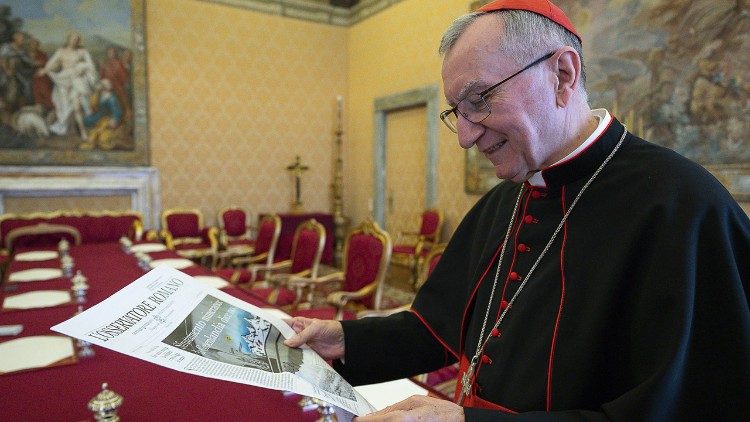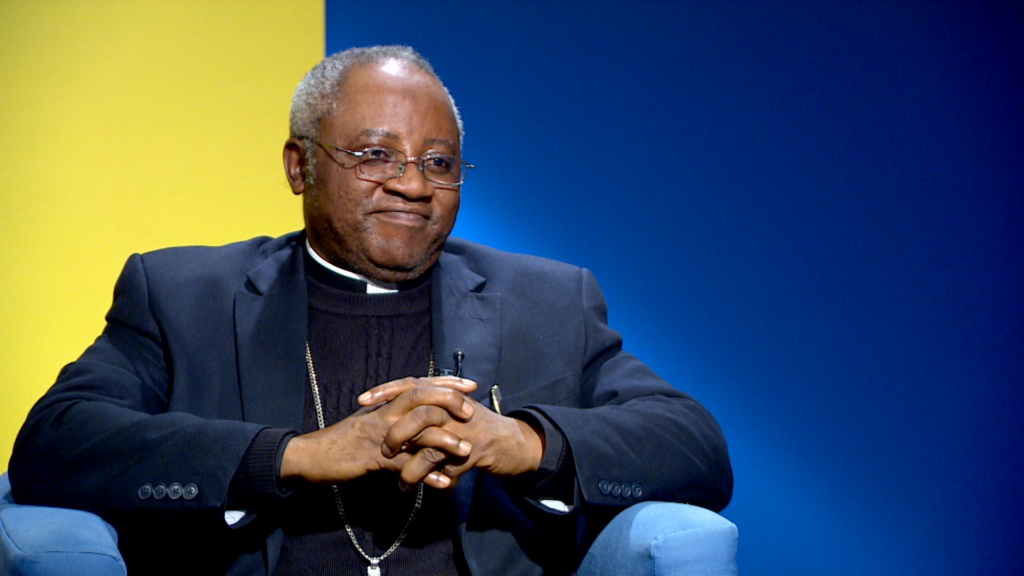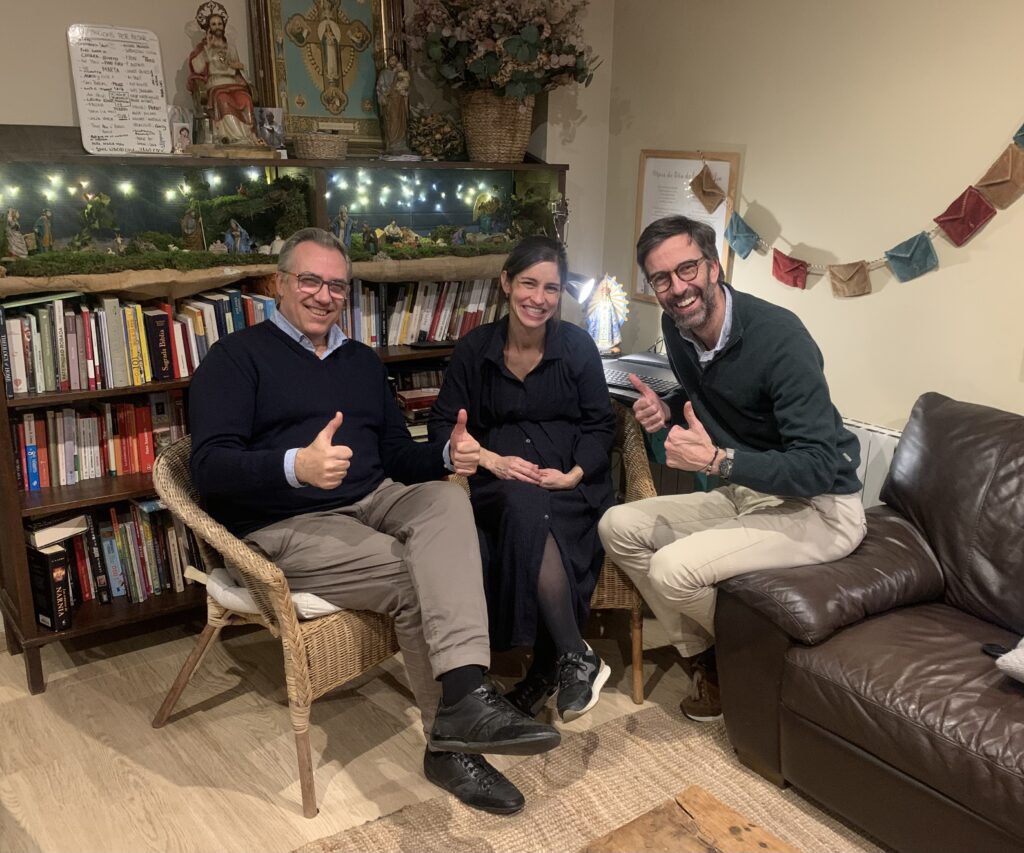Cardinal Parolin: Must Stop Holy Land Conflict
Secretary of State Speaks to Exaudi & Vatican Journalists at Italian Embassy to Holy See’s Ceremony for Book on Long-time L’Osservatore Romano Director Mario Agnes by Ignazio Ingrao

We must do everything possible to end the conflict. Cardinal Pietro Parolin, Vatican Secretary of State, expressed this to Exaudi and a small group of Italian vaticanisti who asked him about the recent wave of violence in the Holy Land.
The Italian prelate was speaking at the private event, presenting the book dedicated to Mario Agnes, who directed Vatican newspaper L’Osservatore Romano from 1984 to 2007, by Ignazio Ingrao, Vaticanista of Italy’s RAI I, on May 18, 2021. Published by Italian publisher San Paolo, the book is titled: “L’Osservatore. Thirty-five Years of Church History in the Private Papers of Mario Agnes.”
Organized by Italian Ambassador to the Holy See Pietro Sebastiani, and President of the Biagio Agnes Foundation, Simona Agnes, the ceremony, moderated by Vatican assessor, Monsignor Dario Edoardo Viganò, took place outdoors, in the cloister of Palazzo Borromeo, in full compliance with anti-Covid-19 rules and provisions.
Cardinal Parolin, Andrea Riccardi, founder of the Community of Sant’Egidio, and famous Italian politician Gianni Letta, gave keynote speeches. Present at the ceremony were other illustrious cardinals, diplomats, nuncios, and politicians.
During the high-profile event, the award dedicated to Mario’s brother, Biagio Agnes, was delivered to current L’Osservatore Romano director, Andrea Monda, in view of the 160th anniversary of the newspaper.
When approached by Exaudi’s Senior Correspondent and a small group of Italian vaticanistas, the Secretary of State reflected on the turmoil plaguing the Holy Land. Exaudi published an exclusive interview following Pope Francis’ dramatic appeal in the region with Latin Patriarch of Jerusalem, Pierbattista Pizzaballa.
When Cardinal Parolin was asked his and the Holy See’s sentiment about the volatile and violent situation, he admitted: “very great concern.”
This worry, he attributes to the fact that “despite the efforts of the International Community to reach a ceasefire,” the situation “has gone this way, and continues this way.”
“It seems that up to now it has not been successful. This conflict is bringing destruction and death.”
The Secretary of State recalled how at Sunday’s Regina Coeli, Pope Francis mentioned especially the innocent children who have been killed.
“Our concern is the same as that of the Holy Father, and is the commitment to do everything possible to stop the conflict,” he underscored.
When asked whether the Holy See could be a mediator at this moment, he responded: “I believe that someone has said that they don’t want interferences; so, a mediator, in the technical sense of the word, perhaps not. I don’t think the conditions exist at present.”
“However,” he continued, “it’s necessary that any action, any initiative of good will, must lead to a cease-fire. Direct negotiations must be taken up again between the two sides, in such a way that puts an end to this age-old conflict and reaches a solution. The solution ought to be in keeping with the two-State solution, which will enable each of them to live in peace.”
Some noted that on Saturday, he will meet with President of the European Commission, Ursula Von Der Leyen, and asked whether he will speak with her about the Middle East crisis.
“Yes, certainly, in the sense of stressing all that the European Union can do at this moment,” he responded, stressing the “necessity” to “unite all forces to seek to halt this crisis.”
EXAUDI has obtained the full remarks of Cardinal Parolin at today’s event and has provided an unofficial working translation of the entire text below:
***
A cordial greeting to His Excellency Ambassador Sebastiani, to the distinguished speakers and to all of you present here.
I am pleased to be able to participate in the presentation of the book L’Osservatore, which gives us the opportunity to remember Mario Agnes, a leading figure in the world of journalism, in particular of Vatican information; who was also president of the Azione Cattolica and then municipal councilor of Rome, always with a spirit of service and in search of an incarnation of the Gospel in human history.
I am pleased to be here, as well as to pay homage to such a significant personality in Italian and Vatican history, also because I met Professor Agnes directly and I had the opportunity to collaborate together in the period from 2002 to 2007, during my tenure as Undersecretary of the Section for Relations with States. We often exchanged phone calls, at the end of the morning, when it came to publishing articles on particularly delicate political situations and issues, articles which subsequently, with the opinion of the Section, passed to the substitute for General Affairs, as Cardinal Sandri recalls, on page 172 of the book.
Precisely starting from this personal memory, I would like to underline the red thread that has characterized the man and the professional and that can be glimpsed in these pages, where Ignazio Ingrao traces some salient episodes of the history of the Church and of Italy which he witnessed.
In his articles and writings there is always a strong inspiration for this theme that has crossed the pontificates, from that of Paul who called him to chair the publishing company of the newspaper «Avvenire», up to those of John Paul II who appointed him director of “L’Osservatore Romano” and of Benedict XVI that I counted him among his gentlemen, thus introducing him permanently into the pontifical family.
Peace was a priority concern, almost a “leitmotiv” borrowed from Pope Paul VI’s Populorum progressio and corroborated by Pope John Paul II’s magisterium. As Andrea Riccardi recalls, after the historic interreligious meeting wanted by John Paul II in Assisi in 1986, Agnes wrote: “The post-Assisi cannot be resolved in an exciting page of history to be jealously archived, but must become living history”. For the editor of L’Osservatore Romano, in fact, peace was not an ideal or a prerogative of states or international organizations, but a process to be built day by day, each with its own contribution.
If there is one episode that more than others summarizes Agnes’s attitude towards the theme of peace, it is the title “Never again war”, written in large letters, on the occasion of the Gulf War. In a comment published on March 10, 1991, after the “ceasefire” in Iraq while popular uprisings are raging in the country, Agnes stated: “In establishing justice and working for peace, one cannot continue to ignore a problem that is at the bottom of many other problems: the indiscriminate trade in arms of all kinds. Unscrupulously arming the poor to fight each other and pretending that this is a non-existent or irrelevant fact is an ignoble action that cries out for vengeance in the sight of God.”
These are strong reflections, of compelling relevance, which echo the words spoken by Pope Francis in Nagasaki, in November 2019, when he stigmatized the arms race, underlining that “the money spent and the fortunes earned to manufacture, modernize, maintain and sell weapons, which are increasingly destructive, are a continuous attack that cries out to the sky.”
Agnes’s comment, lucid and prophetic, recalls the value of a journalism that does not limit itself to recording the facts, but knows how to go in depth, grasping their essence and having the courage to report. A journalism that Pope Francis has defined «of peace […] without pretense, hostile to falsehoods, to effective slogans and to bombastic declarations; […] a journalism that does not burn the news, but that engages in the research of the real causes of conflicts, to favor their understanding from the roots and overcoming them through the launch of virtuous processes; journalism pledged to indicate alternatives to escalation of the hype and verbal violence “(Message for the 52nd World Communications Day ).
And it is precisely this type of journalism that Mario Agnes embodied, in his long years as editor of L’Osservatore Romano, in the awareness that the newspaper of the Holy See should be “every day a humble but clear, serene but attentive tool, respectful but courageous, faithful but intelligent, of the audacity of the Truth that characterizes the magisterium of John Paul II.”
This sentence contains all the professionalism, dedication and determination with which Agnes has interpreted her role as a communicator. First of all, the adverb “every day” indicates that constant, artisanal, patient work that does not let itself be stunned by the speed that technologies seem to impose more and more, that does not go in search of the like, but that it knows how to find in everyday life – even in what is not evident or is apparently not very “newsworthy” – the threads of a different and lofty narrative.
Then there are the four pairs of adjectives that provide a sort of program, a road map of quality information: the combination “humble but clear” refers to the ability to stop and understand the facts before telling them, without being dominated by haste nor by the presumption of already knowing everything. Only those who are humble put themselves into an attitude of research, question themselves, are not satisfied with remaining on the surface because they know that journalism is service and not an exercise of power. In this sense, humility is the cradle of clarity.
“Serene but attentive” are characteristics that invite you to have a clean look, not tainted by prejudices or obscured by partisan interests, but also scrupulous, lively, ready to grasp the novelty, the beauty, the hope. The journalist is called to be, as John Paul said II to young people, the “morning watchman” who does not resign himself to a world “in which other human beings are dying of hunger, remain illiterate, lack work”, who defends “life at all times” and which strives to “make this land more and more habitable for all “(Prayer Vigil, XV World Youth Day, Rome, 2000).
For Agnes, then, the newspaper had to be “respectful but courageous”, that is, free and always attentive to the dignity of people. A particularly significant note for our time, where language is often used to offend, label and spread hatred, especially in social media, and to feed fake news.
The last couple of adjectives – that is “faithful but intelligent” – summarizes the way in which Agnes understood her mission at the service of the Pope. This is what Pope John Paul II himself recognizes in the letter for the 140th anniversary of the foundation of the newspaper, reported in Ingrao’s book: “I note with pleasure – wrote Giovanni Paolo II – that in addition to being an attentive and vigilant voice of the missionary Pope’s activity on the streets of the world, the newspaper has always tried to communicate to his readers love for the Church and for the Successor of Peter, as well as passion for the Christian truths most felt, or at times contested, by the man of the Third Millennium[…]”
Between these lines and in the life of Agnes – since the time of the presidency of Azione Cattolica – the dedication to the truth, to be sought, to be pursued, to be identified in the haze of disinformation, in the sand of dishonesty, in the cries of sensationalism. “Loving the truth means not only affirming, but living the truth, bearing witness to it with one’s work. Living and working, therefore, with consistency with respect to the words used for a newspaper article or a television report “(Pope Francis, Address to the National Council of the Order of Journalists, 2016).
While working inside the Palazzo, Agnes has never been an expression of “palace” information. For him, the newspaper represented a window on the world, on the inevitably linked and interdependent peoples, on the suffering of the victims of injustices and wars. Not surprisingly, he had wanted to restore the column held by Gonella in L’Osservatore Romano during the years of fascism: Acta Diurna. Those brief, unsigned comments on national and international news offered, unofficially, the point of view of the Holy See on the events of the week. It is enough to scroll through a few titles, reported in the volume, to realize the range of issues addressed and the vastness of the horizon to which the pontificate of John Paul II and the interests of Agnes referred: “Nicaragua”; “The war in Bosnia and Herzegovina, Former Yugoslavia, Croatia: it is urgent to overcome that short viewpoint”; “The murder of Rabin. The effort for peace can be drama at every step.”
There is an international outlook that embraces the whole world, starting from the local context, in an osmotic process that enriches and makes information an opportunity to weave communities, in a universal perspective. Warns Pope Francis in the encyclical Fratelli tutti: «We must pay attention to the global dimension in order not to fall into a daily pettiness. At the same time, it is not appropriate to lose sight of what is local, which makes us walk with our feet on the ground. The two things united prevent one from falling into one of these two extremes: one, that citizens live in an abstract and globalizing universalism, camouflaged passengers of the rear wagon, who admire the fireworks of the world, which belongs to others, open mouth and programmed applause; the other, that they become a folk museum of localist “hermits”, condemned to repeat the same things over and over, unable to allow themselves to be challenged by what is different and to appreciate the beauty that God spreads beyond their borders” (n. 142).
After all, as Pope Francis reminds us, “the whole is more than the parts, and it is also more than their simple sum” (Evangelii Gaudium n. 235). Mario Agnes, with his life and his way of understanding the profession, taught us that we must always broaden our gaze to recognize a greater good that brings benefits for all. The historian Giorgio Rumi stressed that Agnes “did not want to be a judge or a chronicler. Instead, he chose the path of witness, in fidelity of mind and heart to the Pontiff. And through the naturalness of harmony, he has made a contribution of friendship to the present day, particularly fruitful because it is addressed to the truth of all time.”
Truth and testimony. This is the greatest legacy that the director of L’Osservatore Romano has left to the operators of communication and to all of us, and that this work gives us.
[Working translation by Exaudi’s Deborah Castellano Lubov]
Related

Thy will be done
Albert Cortina
17 April, 2025
35 min

Despite hardships, Christianity is growing “astronomically” in northern Nigeria
Ayuda a la Iglesia Necesitada
10 April, 2025
3 min

“Christianity, a Powerful Engine of Social Transformation”
Exaudi Staff
09 April, 2025
3 min

Let God be God
Albert Cortina
11 March, 2025
25 min
 (EN)
(EN)
 (ES)
(ES)
 (IT)
(IT)

